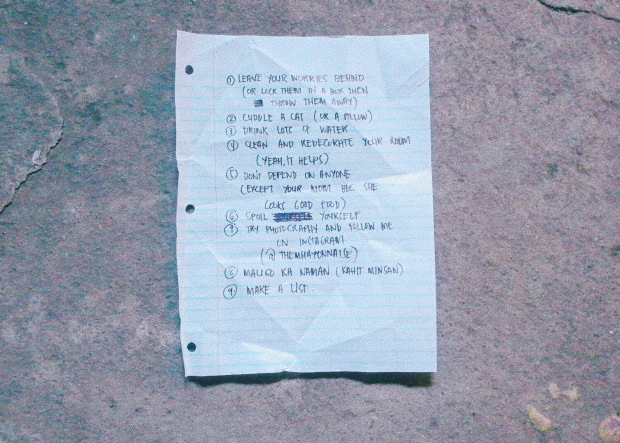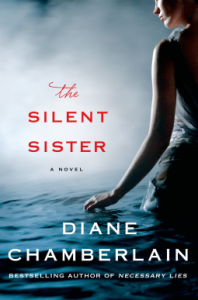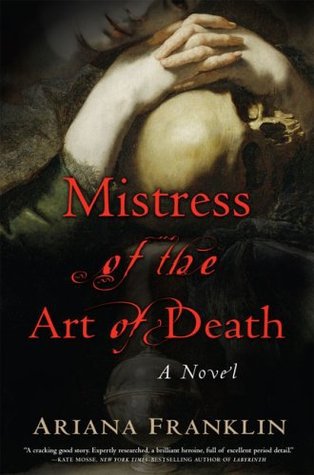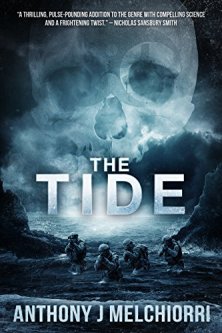…for this year’s nominees and winners of the annual FictionFan Awards of 2017.
For the benefit of new readers, and as a reminder for anyone who was around last year, here’s a quick résumé of the rules…
THE CRITERIAAll nominees must be books I’ve read and reviewed between November 2016 and October 2017 regardless of publication date, but excluding re-reads. The books must have received a 5-star rating.
THE CATEGORIESThe categories tend to change slightly each year to better reflect what I’ve been reading during the year.
This year, there will be Honourable Mentions and a Winner in each of the following categories:
Vintage Crime Fiction/Thriller Factual Modern Crime Fiction/Thriller Literary Fiction …and… Book of the Year 2017 THE PRIZES For the winners!I guarantee to read the author’s next book even if I have to buy it myself!
(NB If an author is unlikely to publish another book due to being dead, I will read a book from his/her back catalogue…)
For the runners-up!Nothing!
THE JUDGESMe!
* * * * * * * * *
So, without further ado, here are this year’s runners-up and winner in…
LITERARY FICTIONAs with crime fiction, I’ve been reading a lot more classic literary fiction this year and therefore not so many contemporary books. There’s been something of an obsession in this year’s new releases from big name authors with thinly-disguised polemical ranting over minority liberal concerns, presumably as a reaction to Trump, which has led to me abandoning more books than usual. But I’ve still had some excellent reads – a mix of old and new…
HONOURABLE MENTIONS The White Guard by Mikhail Bulgakov
The White Guard by Mikhail BulgakovIt is 1918, and Kiev in the Ukraine is at the swirling centre of the forces unleashed by war and revolution. The three Turbin siblings live in the house of their recently deceased mother in the city. They are White Russians, still loyal to the Russian Tsar, hoping against hope that he may have escaped the Bolsheviks and be living still. But there are other factions too – the German Army have installed a puppet leader, the Hetman Skoropadsky, and the Ukranian peasantry are on the march in a nationalist movement, under their leader Petlyura. This is the story of a few short days when the fate of the city seems up for grabs, and the lives of the Turbins, like so many in those turbulent times, are under constant threat.
This is a book about confusion and betrayal, shifting allegiances, chaos and fear. Bulgakov takes a panoramic approach, following one character and then panning off to another. This gives it an episodic feel and adds to the sense of events moving too quickly for the people involved ever to fully grasp. A truly brilliant book that, while concentrating on one small city, gives a brutal and terrifyingly believable picture of the horrors unleashed in the wake of bloody revolution.
The snow would just melt, the green Ukranian grass would grow again and weave its carpet over the earth… The gorgeous sunrises would come again… The air would shimmer with heat above the fields and no more traces of blood would remain. Blood is cheap on those red fields and no one would redeem it.
No one.
Click to see the full review
* * * * * * * * *
 Selection Day by Aravind Adiga
Selection Day by Aravind AdigaTwo brothers are being groomed by their father to become the greatest cricketers in India. Their mother having disappeared when they were little (run away? dead? The boys aren’t sure), the brothers have been brought up by their tyrannical father Mohan, who is determined they will succeed in the sport as a way to raise the family out of the slums. So when the chance of sponsorship comes along, Mohan grabs it, even though it’s at best an unethical deal which sells his sons into a kind of bondage and, at worst, borders on the illegal.
This is a story of sibling rivalry, tied in with a wider picture of corruption in society shown through the corruption in cricket. Adiga depicts the poverty and class divisions in contemporary Mumbai quite clearly but he also shows the other side – the vibrancy, the struggle for social mobility, the advances of recent years. The book tackles some tough subjects, but there’s also humour in there, and happily there’s no whiff of the polemical. And as always Adiga’s writing is pure pleasure to read.
“People thought I had a future as a writer, Manju. I wanted to write a great novel about Mumbai,” the principal said, playing with her glasses. “But then…then I began, and I could not write it. The only thing I could write about, in fact, was that I couldn’t write about the city.
“The sun, which I can’t describe like Homer, rises over Mumbai, which I can’t describe like Salman Rushdie, creating new moral dilemmas for all of us, which I won’t be able to describe like Amitav Ghosh.”
Click to see the full review
* * * * * * * * *
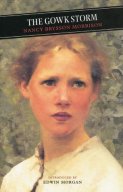 The Gowk Storm by Nancy Brysson Morrison
The Gowk Storm by Nancy Brysson MorrisonThis is the tale of three sisters, daughters of the minister in a parish in the Highlands of Scotland. Our narrator is the youngest of the three, Lisbet, who over the course of the couple of years of the book’s story grows from a girl only half comprehending her elder sisters’ early forays into the world of romantic love, into a young woman on whom the two older girls come to depend for support. The book was published in 1933 and it reads as if the story is set somewhere in the decade or two before that, at a time when young girls had more freedom than Austen’s heroines, for example, but were still confined by lack of opportunity and girded round by social restrictions, breaches of which would inevitably lead to scandal and ruin.
The quality of the writing and characterisation; the beautiful descriptions of the wild landscape and weather of the Highlands; the delicately nuanced portrayal of the position of women within this small, rather isolated society; the story that manages tragedy without melodrama and hope without implausibility – all of these mean it richly merits its status as a Scottish classic, and deserves a much wider readership than it has.
The carriage moved forward. We turned the bend in the road where we used to stand to see if any one were coming. I heard the immeasurable murmur of the loch, like a far-away wave that never breaks upon the shore, and the cry of a curlew. All the world’s sorrow, all the world’s pain, and none of its regret, lay throbbing in that cry.
Click to see the full review
* * * * * * * * *
 The Tsar of Love and Techno by Anthony Marra
The Tsar of Love and Techno by Anthony MarraLeningrad, 1937; Kirovsk, 2013; Grozny, Chechnya, 2003. These are the three locations in which this collection of stories take place, over the period of the last century. The stories are so beautifully interlinked that the eventual effect is to create something that really must be considered a novel. The central linking stories are those of the ballerina Galina and her first love, Kolya, who later becomes a soldier in the war in Chechnya; and of an invented painting by the Chechen artist, Zakharov, altered repeatedly by the people into whose hands it falls over the decades, till it becomes a kind of metaphor, partly for the way history can be altered to suit the agenda of the historian, and partly of the different perceptions people can have of the same events.
Some of the stories are tragic, some more uplifting, but none are monotone – each has moments of heartbreak and, not joy perhaps, but fellowship and humour, humanity breaking through in even the most inhumane circumstances. The characterisation is superb throughout – so many characters and all very different, but each ringing entirely true; no real heroes or villains, just people trying to get through their lives as best they can. A stunning book, that could have so easily won…
The portrait artist must acknowledge human complexity with each brushstroke. The eyes, nose and mouth that compose a sitter’s face, just like the suffering and joy that compose his soul, are similar to those of ten million others yet still singular to him. This acknowledgment is where art begins. It may also be where mercy begins. If criminals drew the faces of their victims before perpetrating their crimes and judges drew the faces of the guilty before sentencing them, then there would be no faces for executioners to draw.
Click to see the full review
* * * * * * * * *
FICTIONFAN AWARD WINNER 2017 for BEST LITERARY FICTION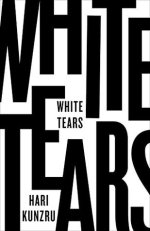
When Seth and Carter meet at college, they discover a shared appreciation for music – not as musicians, but as listeners and producers. Seth has the technical skills and Carter’s family is rich, so they’re able to set up their own studio. Loving the distinctive sound of vinyl, Carter eventually works his way back in time till he has become a knowledgeable collector of old 78s, especially blues. Seth too had gone on a musical trip back in time, during a period in his teens after his mother died, when he isolated himself from the world in his room and escaped into the world of early records. But Seth had reached a point where he believed he could hear ghosts behind the music…
A difficult book to summarise since it only slowly reveals where it’s heading and the journey of discovery is the important thing. In the end, it’s about race, and cultural appropriation, and race guilt. About how music, specifically recordings, can let us visit the past. How acquisition can become more important than art – ownership and control above appreciation. There are references to blackface and minstrelsy, and white tourism of black history. It’s a book of two halves, the slowness of the first half well outweighed by the subtlety and power, and the compelling originality of the language in the second.
Day after day. Always on the move. My boot heels quite worn away. Wolfmouth only left me alone when I came home at night. Even then he followed me through the hallways, tap dancing up the stairs. He followed me, he follows me. Step scuff smack step, step scuff smack step. Echoing in the stairwell at the end of another long day.
– The kooks, there are more of them all the time.
– That’s right, Mrs. Waxman.
Carrying my groceries past her door. The stink of her cats.
I hole up, lock the door, fix the chain. Step scuff smack step, shuffling in the hallway. Then, at last, silence. I am not sure if he goes away.
Click to see the full review
* * * * * * * * *
And now… the nominees for the Book of the Year Award are…
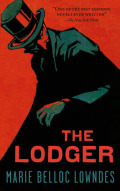



FICTIONFAN BOOK OF THE YEAR 2017 THE WINNER

This was rather a slow burn for me, in that it continued to grow in stature in my mind long after I’d finished reading it, and I found that some of the images and, in particular, the superb use of language in the second half had taken up permanent residence. It’s not unflawed – the two halves feel a little unbalanced. But it has a lot to say about race in America and says it in a unique and original way, for the most part avoiding the use of liberal polemics that has become so prevalent in contemporary literary fiction. A wonderful story, wonderfully told. It becomes almost like reading a vivid dream – short sentences giving us a glimpse of a thing or snatching at a sound, then moving wildly away to the next thing. Often just a few words create a picture in the mind. It becomes disorientating and strangely disturbing after a bit, and I found it totally compelling. The narrative shifts around in space and time, in reality and illusion (delusion?), and the story gradually gets darker and more violent. A book that fully captures the essence of the early blues music which it takes as its central motif…
Every sound wave has a physiological effect, every vibration. I once heard a field recording of a woman singing, sitting on a porch. You could hear her foot tapping, keeping time. You could hear the creak of her rocking chair, the crickets in the trees. You could tell it was evening because of the crickets. I felt I was slipping, that if I wasn’t careful I’d lose my grip on the present and find myself back there, seventy or eighty years in the past. The rough board floor, the overhang of the roof, her voice travelling through the moist heavy air to the diaphragm of the microphone, its sound converted into electrical energy, frozen, then the whole process reversed, electricity moving a speaker cone, sound spilling into my ears and connecting me to that long-ago time and place. I could feel it flow, that voice, inhabiting the cavities of my body, displacing the present like water filling a cistern.
Click to see the full review
* * * * * * * * *
Thanks to all of you who’ve joined me for this year’s awards feature. I hope you’ve enjoyed it – I’ve enjoyed your company!Please feel free to share this:
- More
